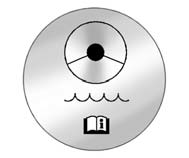Power Steering Fluid

See Engine Compartment Overview for reservoir location.
When to Check Power Steering Fluid
It is not necessary to regularly check power steering fluid unless a leak is suspected in the system or unusual noise is heard. A fluid loss in this system could indicate a problem. Have the system inspected and repaired.
How to Check Power Steering Fluid
Notice: Extremely small amounts of contamination can cause steering
system damage and cause it to not work properly.
Do not allow contaminants to contact the fluid side of the reservoir
cap/dipstick or to enter the reservoir.
To check the power steering fluid:
1. Turn the engine off and let the engine compartment cool down.
2. Remove the engine cover, if required. See Engine Cover.
3. Wipe the cap and the top of the reservoir clean.
4. Unscrew the cap and wipe the dipstick with a clean rag.
5. Replace the cap and completely tighten it.
6. Remove the cap again and look at the fluid level on the dipstick.
The level should be within the HOT mark. If necessary, add only enough fluid to bring the level within the mark.
What to Use
To determine what kind of fluid to use, see Recommended Fluids and Lubricants. Always use the proper fluid.
See also:
Steering Wheel Adjustment
Push the control up or down to tilt the steering wheel up or down.
To set the memory position, see Vehicle Personalization . ...
Headlamp High/Low-Beam Changer
Push the turn signal/lane change lever away from you and release, to turn
the high beams on. To return to low beams, push the lever again or pull it
toward you and release.
This indicator lig ...
Operation
Full View of Radio with CD Shown, Radio with Six-Disc CD Similar
Partial View of Radio with DVD Audio, Hard Drive
Device (HDD), and USB
The vehicle may have one of these
radios as its audio ...






